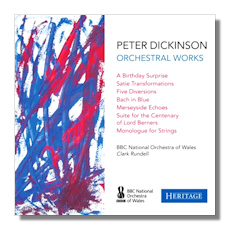
The Internet's Premier Classical Music Source
Related Links
- Dickinson Reviews
- Latest Reviews
- More Reviews
-
By Composer
-
Collections
DVD & Blu-ray
Books
Concert Reviews
Articles/Interviews
Software
Audio
Search Amazon
Recommended Links
Site News
 CD Review
CD Review
Peter Dickinson

Orchestral Works
- A Birthday Surprise
- Satie Transformations
- Five Diversions
- Bach in Blue
- Merseyside Echoes
- Suite for the Centenary of Lord Berners
- Monologue for Strings
BBC Orchestra of Wales/Clark Rundell
Recorded at Hoddinott Hall, Cardiff, 7-8 September 2015
Heritage HTGCD211 70:15
Peter Dickinson is among the most fortunate of recent composers, in having a large amount of his oeuvre preserved for posterity on good recordings (this in addition to the publication of several books). At this point I have reviewed on this site more than forty of Dickinson's musical works, in various styles, for various forces, and on various labels, so it is going to be no surprise that my account of this new disc is going to be favorable. As it happens, this may prove to be my personal favorite among his recordings – though this is not meant to slight the outstanding disc of his three concertos, among other releases.
The chronology of the pieces here range from his early American studies at Juilliard to the past year, four of them in revised form. Some were previously performed and recorded for solo piano; I prefer their present embodiment. Dickinson's three years in America when he was young gave him a taste for jazz and it is clear that this stayed with him into his later years.
Taking these in order of their arrangement on the CD, A Birthday Surprise (1979) is quite different from the several clever versions of such a transformations I have heard on occasion. It begins in a very hushed manner but I shall not spoil the surprise of what it turns into. The Satie Transformations (1969-70), which the composer declares is "a dream-like fantasy," based on the first three Gnossiennes. It seems to be in its original version here; Dickinson says "the melodies of all three are clearly heard in various forms…" but I have to confess that if he had not said so I might have missed this on early acquaintance with the transformations.
Five Diversions (Prelude, Aria, Ragtime, Saraband [sic], Finale – 1963/70) were originally composed for Clavichord, dedicated to his wife Bridget, and recorded on Dickinson's disc Blue Clavichord, which I have not heard, though this is also on his Piano Music CD. The longest, and most beautiful, of these movements is the Aria, hushed and exquisite, now mostly for strings.
Bach in Blue (2004/2012/2015), based on a Bach Prelude is a very recent work, especially as presented here. It was previously for piano and had a version for clarinet, violin and piano; more strings have now been added. The clarinet part is very fine. Merseyside Echoes (1988) is a tribute to The Beatles. It is full-throated but with changes of pace and mood, including jazzy treatment and some nice quiet percussion moments.
Lord Berners (1883-1950, born Gerald Hugh Tyrwhitt) is a composer I know only through some of his ballet scores and from a five page account in Michael Trend's The Music Makers: The English Musical Renaissance from Elgar to Britten. (I now find that one of Dickinson's books is about Berners; I have not seen it yet, but I know where to find a library copy.) Trend says that Stravinsky regarded Berners highly, especially among English composers. Besides music, Berners wrote novels and he was also an artist; a witty man (and to use Shaw's words, Berners was not one of those Englishmen most of whose pleasures could be "shared by his dog.") Dickinson's Suite for the Centenary of Lord Berners (1974/1983/2015) is in six short movements (Blues, Jig, March, Dirge, Waltz, Blues ). It was originally composed for the clavichord (especially suited for blue notes, the composer says) and based on music originally written for a film. The March has a rather plodding pace and the opening of the Dirge is distinctly reminiscent of Chopin's funeral march. The Dirge is followed by a waltz. Berners wrote a number of waltzes and Dickinson says this one was written affectionately in Berners own style.
The final piece, Monologue for Strings (1959), was written for a competition when Dickinson was a graduate student at Juilliard. The sponsor expressed a wish for quiet music in a conservative vein. Dickinson produced a work that is quiet, with some pizzicato and some harmony which to my ears sounds modal, but otherwise Dickinson admits that he did not make it conservative. He calls the music somber, but I am not sure I would agree. I like it.
Highly recommended.
Copyright © 2016, R. James Tobin












